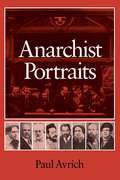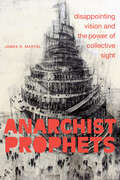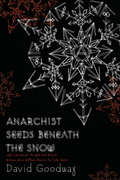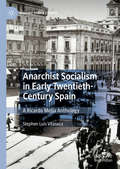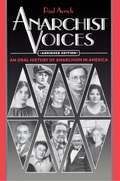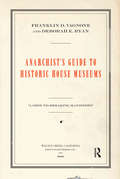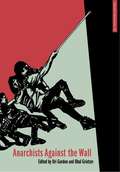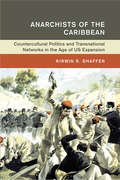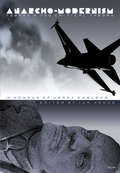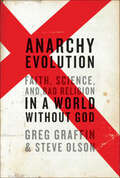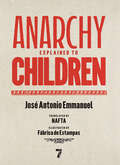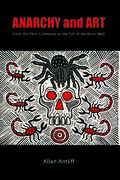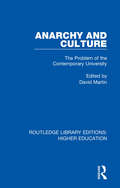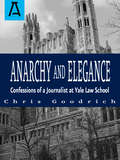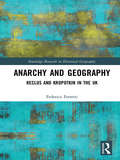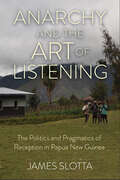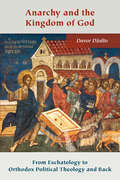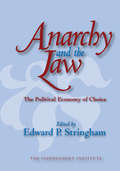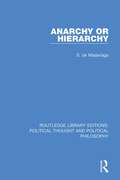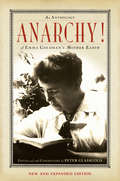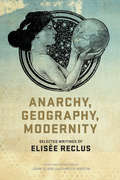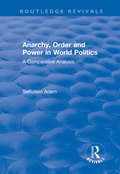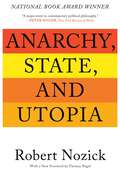- Table View
- List View
Anarchist Portraits
by Paul AvrichFrom the celebrated Russian intellectuals Michael Bakunin and Peter Kropotkin to the little-known Australian bootmaker and radical speaker J. W. Fleming, this book probes the lives and personalities of representative anarchists.
Anarchist Prophets: Disappointing Vision and the Power of Collective Sight
by James R. MartelIn Anarchist Prophets James R. Martel juxtaposes anarchism with what he calls archism in order to theorize the potential for a radical democratic politics. He shows how archism—a centralized and hierarchical political form that is a secularization of ancient Greek and Hebrew prophetic traditions—dominates contemporary politics through a prophet’s promises of peace and prosperity or the threat of violence. Archism is met by anarchism, in which a community shares a collective form of judgment and vision. Martel focuses on the figure of the anarchist prophet, who leads efforts to regain the authority for the community that archism has stolen. The goal of anarchist prophets is to render themselves obsolete and to cede power back to the collective so as to not become archist themselves. Martel locates anarchist prophets in a range of philosophical, literary, and historical examples, from Hobbes and Nietzsche to Mary Shelley and Octavia Butler to Kurdish resistance in Syria and the Spanish Revolution. In so doing, Martel highlights how anarchist forms of collective vision and action can provide the means to overthrow archist authority.
Anarchist Seeds Beneath the Snow: Left-Libertarian Thought and British Writers from William Morris to Colin Ward (Liverpool University Press Ser.)
by David GoodwayFrom William Morris to Oscar Wilde and George Orwell, left-libertarian thought has long been an important but neglected part of British cultural and political history. In this detailed study, David Goodway seeks to recover and revitalize that indigenous anarchist tradition. This book succeeds as both a cultural history of left-libertarian thought in Britain and an application of that history to current politics. The author argues that a recovered anarchist tradition could—and should—be a touchstone for contemporary political radicals. Moving seamlessly from Aldous Huxley and Colin Ward to the war in Iraq, this challenging volume will energize leftist movements throughout the world.
Anarchist Socialism in Early Twentieth-Century Spain: A Ricardo Mella Anthology (Hispanic Urban Studies)
by Stephen Luis VilasecaAnarchist Socialism in Early 20th Century Spain is the first English translation of and critical introduction to Ideario, a collection of newspaper and journal articles written by Spanish anarchist Ricardo Mella. Given that Mella is virtually unknown to the English-speaking world, this book provides readers access to his extensive body of work about Spain, human nature, and a world increasingly dominated by capitalism. Suitable for both the general public interested in learning more about anarchist ideas and for scholars studying twentieth-century Spain, the three introductory essays help to introduce Mella, ground his work in the context of Spanish anarchism, and draw connections between Mella and the urban in late nineteenth- and early twentieth-century Spain. Stephen Luis Vilaseca’s translation is accessible and engaging.
Anarchist Voices: An Oral History of Anarchism in America - Abridged paperback Edition
by Paul AvrichThrough his many books on the history of anarchism, Paul Avrich has done much to dispel the public's conception of the anarchists as mere terrorists. In Anarchist Voices, Avrich lets American anarchists speak for themselves. This abridged edition contains fifty-three interviews conducted by Avrich over a period of thirty years, interviews that portray the human dimensions of a movement much maligned by the authorities and contemporary journalists. Most of the interviewees (anarchists as well as their friends and relatives) were active during the heyday of the movement, between the 1880s and the 1930s. They represent all schools of anarchism and include both famous figures and minor ones, previously overlooked by most historians. Their stories provide a wealth of personal detail about such anarchist luminaries as Emma Goldman and Sacco and Vanzetti.
Anarchist's Guide to Historic House Museums
by Franklin D Vagnone Deborah E RyanIn these days of an aging traditional audience, shrinking attendance, tightened budgets, increased competition, and exponential growth in new types of communication methods, America’s house museums need to take bold steps and expand their overall purpose beyond those of the traditional museum. They need not only to engage the communities surrounding them, but also to collaborate with visitors on the type and quality of experience they provide. This book is a groundbreaking manifesto that calls for the establishment of a more inclusive, visitor-centered paradigm based on the shared experience of human habitation. It draws inspiration from film, theater, public art, and urban design to transform historic house museums while providing a how-to guide for making historic house museums sustainable, through five primary themes: communicating with the surrounding community, engaging the community, re-imagining the visitor experience, celebrating the detritus of human habitation, and acknowledging the illusion of the shelter’s authenticity. Anarchist's Guide to Historic House Museums offers a wry, but informed, rule-breaking perspective from authors with years of experience and gives numerous vivid examples of both good and not-so-good practices from house museums in the U.S.
Anarchists Against the Wall
by Uri Gordon Ohal GrietzerPart of a small but growing phenomenon in Israel since 2003, Anarchists Against the Wall have been boldly challenging the Segregation Barrier and generalised violence against occupied Palestine. The reflections herein offer a window into some of the most dynamic direct action activism today. Includes contributions from several well-respected journalists and political commentators, including: Bill Templer, Adar Grayevsky, Yanai Israeli, Kobi Snitz, Anat Guthmann, Anat Matar, Neve Gordon, Yossi Bartal, Sarah Assouline, Basel Mansour and the editors themselves.
Anarchists of the Caribbean: Countercultural Politics and Transnational Networks in the Age of US Expansion (Global and International History)
by Kirwin R. ShafferAnarchists who supported the Cuban War for Independence in the 1890s launched a transnational network linking radical leftists from their revolutionary hub in Havana, Cuba to South Florida, Puerto Rico, Panama, the Panama Canal Zone, and beyond. Over three decades, anarchists migrated around the Caribbean and back and forth to the US, printed fiction and poetry promoting their projects, transferred money and information across political borders for a variety of causes, and attacked (verbally and physically) the expansion of US imperialism in the “American Mediterranean.” In response, US security officials forged their own transnational anti-anarchist campaigns with officials across the Caribbean. In this sweeping new history, Kirwin R. Shaffer brings together research in anarchist politics, transnational networks, radical journalism and migration studies to illustrate how men and women throughout the Caribbean basin and beyond sought to shape a counter-globalization initiative to challenge the emergence of modern capitalism and US foreign policy whilst rejecting nationalist projects and Marxist state socialism.
Anarcho-Modernism
by Ian AngusThis volume is a collection of 38 pieces - essays, poems, extracts - unified by a combination of the playful, primitive aesthetic of literary modernism with the anti-authoritarian, anarchist praxis of radical democratic politics. This bi-polar sensibility permeates the work of Jerry Zaslove, to whom the book is dedicated.
Anarchy Evolution: Faith, Science, and Bad Religion in a World Without God
by Greg Graffin Steve OlsonFrompunk rock bandBad Religion’s Greg Graffin and Steve Olson, Anarchy Evolution is a provocative look at the collision between religion and science.“Take one man who rejects authority and religion, and leads a punk band. Take another man who wonders whether vertebrates arose in rivers or in the ocean. . . . Put them together, what do you get? Greg Graffin, and this uniquely fascinating book.” —Pulitzer Prize-winning and New York Times–bestselling author Jared DiamondFrom an author with unique authority: UCLA lecturer in Paleontology, and founding member of Bad Religion, Greg Graffin and award-winning science writer Steve Olson, Anarchy Evolution delivers a powerful discussion sure to strike a chord with readers of Richard Dawkins’ The God Delusion or Christopher Hitchens’ God Is Not Great. “Anarchy Evolution sets out to draw connections between evolution, naturalist thought, and punk, an undertaking that may sound rife with the potential to be reachy—or preachy. But Graffin and Olson manage to weave the seemingly disparate concepts together into a satisfying narrative.” —LA Weekly“Graffin is one of those rare people who seem to have combined two lives into one. He’s one of a small but growing number of atheists in the United States willing to talk about the damage they believe religion can do.” —Paste
Anarchy Explained to Children
by José Antonio EmmanuelBoth an extraordinary 1930s text on anarchism in its original sense of liberatory principles of equality and mutual support, and short chapters with all-age-appropriate illustrations and explanations of each principle.A gorgeous package with a new intro and original engravings will appeal to progressive parents and children alike.Here is a modern book for progressive readers of all ages that includes the prescient 1931 pamphlet, "Anarchy Explained to Children," by José Antonio Emmanuel writing under the pseudonym Max Bembo, a teacher and anarchist philanthropist who advocated for, among other things, freeing the education of children from the power of the Catholic Church. In the essay he offers to the children of working-class families a simple explanation of liberatory principles and how to put them into practice.Following the essay, each of the principles he proposes is explained very simply in a double page spread accompanied by an engraving, which conveys the beauty of the world that Emmanuel envisioned. The engravings were newly created for the 2017 Argentine edition of this book.Anarchy Explained to Children will appeal to parents and educators who are interested in sharing with a young reader the ideals of liberatory education, in which extremism and oppression are banished, and values of mutual support, equality between individuals, universal love and human solidarity are promoted.&“Help: To those who hesitate, give them encouragement: to those who despair of seeing victory far away, give them courage. Mutual help is a sacred and universal duty.&”
Anarchy Unbound
by Peter T. LeesonIn Anarchy Unbound, Peter T. Leeson uses rational choice theory to explore the benefits of self-governance. Relying on experience from the past and present, Professor Leeson provides evidence of anarchy "working" where it is least expected to do so and explains how this is possible. Provocatively, Leeson argues that in some cases anarchy may even outperform government as a system of social organization, and demonstrates where this may occur. Anarchy Unbound challenges the conventional self-governance wisdom. It showcases the incredible ingenuity of private individuals to secure social cooperation without government and how their surprising means of doing so can be superior to reliance on the state.
Anarchy and Art
by Allan AntliffOne of the powers of art is its ability to convey the human aspects of political events. In this fascinating survey on art, artists, and anarchism, Allan Antliff interrogates critical moments when anarchist artists have confronted pivotal events over the past 140 years. The survey begins with Gustave Courbet's activism during the 1871 Paris Commune (which established the French republic) and ends with anarchist art during the fall of the Soviet empire. Other subjects include the French neoimpressionists, the Dada movement in New York, anarchist art during the Russian Revolution, political art of the 1960s, and gay art and politics post-World War II. Throughout, Antliff vividly explores art's potential as a vehicle for social change and how it can also shape the course of political events, both historic and present-day; it is a book for the politically engaged and art aficionados alike. Allan Antliff is the author of Anarchist Modernism.
Anarchy and Culture: The Problem of the Contemporary University (Routledge Library Editions: Higher Education #18)
by David MartinOriginally published in 1969, Anarchy and Culture both documents and describes the influence of the student and academic in the case of revolution and protest within the university. The book looks at the theory behind the culture of revolution within the contemporary university and comments upon the affect this has upon teaching, as well as the student experience. This edited collection contains a wide range of essays from a broad range of contributors in the fields of Sociology, English, and Education. Focusing predominately on study of the university in the UK, the book covers a spread of political comment, and personal attitude in analysing culture and anarchy in relation to the contemporary university.
Anarchy and Elegance: Confessions of a Journalist at Yale Law School
by Chris GoodrichIn Anarchy and Elegance Chris Goodrich deconstructs the inner workings of legal education at the nation's most prestigious law school. A former legal reporter, Goodrich - a Yale graduate - attended the law school on a year-long fellowship for journalists, and soon found himself in a mare's nest of conflicting ideas, emotions, and social visions. His class-by-class account, which showed exactly how law students learn to "think like lawyers," highlights the tension between the often-elegant abstractions of law and the messy, anarchic specifics of "real life." (Edmund Burke's alleged view: "Law sharpens the mind by narrowing it.") His initial skepticism about the law's tendency to operate in a self-referential, we-know-best manner is slowly tempered by admiration for its rigorous methods and theoretical good-faith, and results in a book that proves as entertaining as it is informative.Anarchy and Elegance has been called:"[T]he most creative book on law school in recent memory" (John Jay Osborne, author of The Paper Chase) "A perceptive and insightful inside look at one of America's most influential institutions" (Charles A. Reich, former Yale Law professor and author of The Greening of America) "[A] vivid, amusing and thought-provoking description of what it feels like on the [legal] battlefield" (Robert Heilbroner, author of The Wordly Philosophers)"[Essential, cautionary reading for budding lawyers" (Publishers Weekly)."[A] masterful contribution of the literature of reportage" (Magill Book Review)"[A] bull's eye" (The Jerusalem Post).
Anarchy and Geography: Reclus and Kropotkin in the UK (Routledge Research in Historical Geography)
by Federico FerrettiThis book provides a historical account of anarchist geographies in the UK and the implications for current practice. It looks at the works of Frenchman Élisée Reclus (1830–1905) and Russian Pyotr Kropotkin (1842–1921) which were cultivated during their exile in Britain and Ireland. Anarchist geographies have recently gained considerable interest across scholarly disciplines. Many aspects of the international anarchist tradition remain little-known and English-speaking scholarship remains mostly impenetrable to authors. Inspired by approaches in historiography and mobilities, this book links print culture and Reclus and Kropotkin’s spheres in Britain and Ireland. The author draws on primary sources, biographical links and political circles to establish the early networks of anarchist geographies. Their social, cultural and geographical context played a decisive role in the formation and dissemination of anarchist ideas on geographies of social inequalities, anti-colonialism, anti-racism, feminism, civil liberties, animal rights and ‘humane’ or humanistic approaches to socialism. This book will be relevant to anarchist geographers and is recommended supplementary reading for individuals studying historical geography, history, geopolitics and anti-colonialism.
Anarchy and Legal Order
by Gary ChartierThis book elaborates and defends the idea of law without the state. Animated by a vision of peaceful, voluntary cooperation as a social ideal and building on a careful account of non-aggression, it features a clear explanation of why the state is illegitimate, dangerous, and unnecessary. It proposes an understanding of how law enforcement in a stateless society could be legitimate and what the optimal substance of law without the state might be, suggests ways in which a stateless legal order could foster the growth of a culture of freedom, and situates the project it elaborates in relation to leftist, anti-capitalist, and socialist traditions.
Anarchy and the Art of Listening: The Politics and Pragmatics of Reception in Papua New Guinea
by James SlottaAnarchy and the Art of Listening is an ethnography of politics as it is practiced on the other side of the spoken word, in the act of listening. James Slotta explores how people in the Yopno Valley of Papua New Guinea cultivate their listening to exercise power, shape their futures, and sustain their communities in the face of ambitious leaders and powerful outside institutions. As in many parts of the global south, missionaries, NGO workers, educators, mining companies, politicians, development experts, and others have sought to transform life in and around the Yopno Valley. But as this book makes clear, people there have not been a passive and pliable audience for these efforts. They have brought their skills as "anarchic listeners" to these encounters, advancing political agendas of their own.To understand political life in the Yopno Valley, we need to look not only at political speech but at the practices that lie on the other side of the word in the act of listening. This, Slotta suggests, is also true well beyond the bounds of the Yopno Valley.
Anarchy and the Kingdom of God: From Eschatology to Orthodox Political Theology and Back (Orthodox Christianity and Contemporary Thought)
by Davor DžaltoAnarchy and the Kingdom of God reclaims the concept of “anarchism” both as a political philosophy and a way of thinking of the sociopolitical sphere from a theological perspective. Through a genuinely theological approach to the issues of power, coercion, and oppression, Davor Džalto advances human freedom—one of the most prominent forces in human history—as a foundational theological principle in Christianity. That principle enables a fresh reexamination of the problems of democracy and justice in the age of global (neoliberal) capitalism.
Anarchy and the Law: The Political Economy of Choice
by Edward P. StringhamPrivate-property anarchism, also known as anarchist libertarianism, individualist anarchism, and anarcho-capitalism, is a political philosophy and set of economic and legal arguments that maintains that, just as the markets and private institutions of civil society provide food, shelter, and other human needs, markets and contracts should provide law and that the rule of law itself can only be understood as a private institution.To the libertarian, the state and its police powers are not benign societal forces, but a system of conquest, authoritarianism, and occupation. But whereas limited government libertarians argue in favor of political constraints, anarchist libertarians argue that, to check government against abuse, the state itself must be replaced by a social order of self-government based on contracts. Indeed, contemporary history has shown that limited government is untenable, as it is inherently unstable and prone to corruption, being dependent on the interest-group politics of the state's current leadership. Anarchy and the Law presents the most important essays explaining, debating, and examining historical examples of stateless orders.Section I, "Theory of Private Property Anarchism," presents articles that criticize arguments for government law enforcement and discuss how the private sector can provide law. In Section II, "Debate," limited government libertarians argue with anarchist libertarians about the morality and viability of private-sector law enforcement. Section III, "History of Anarchist Thought," contains a sampling of both classic anarchist works and modern studies of the history of anarchist thought and societies. Section IV, "Historical Case Studies of Non-Government Law Enforcement," shows that the idea that markets can function without state coercion is an entirely viable concept. Anarchy and the Law is a comprehensive reader on anarchist libertarian thought that will be welcomed by students of govern
Anarchy or Hierarchy (Routledge Library Editions: Political Thought and Political Philosophy #36)
by S. de MadariagaOriginally published in 1937 during the Spanish Civil War, the country was split into pro-fascists and pro-communists, the author felt that the conflict in Spain threatened to develop into an international war, perhaps an international civil war since the issue cut across frontier lines. The situation had no parallel at the time. The author looks back to wars of the sixteenth century to find a precedent for this dramatic duel between two political conceptions. Using examples from Europe including the conflict between Catholics and Protestants he shows that, as in England who led their own way at the time, there are alternative solutions and hopefully a way to find a middle ground.
Anarchy!: An Anthology of Emma Goldman's Mother Earth
by Peter GlassgoldIn Anarchy! An Anthology of Emma Goldman's Mother Earth, Peter Glassgold brings to the page political activist and anarchist Emma Goldman's most radical contribution, Mother Earth, a monthly journal about social science and literature. Glassgold has compiled Mother Earth's most provocative articles, with thematic categories ranging from "The Woman Question" to "The Social War" and features a diverse selection of writers, such as Leo Tolstoy, Margaret Sanger, Peter Kropotkin, and Alexander Berkman.Mother Earth was published from 1906 to 1918, when birth control, the labor movement, sexual freedom, and the arts where common subjects. The supporters of the journal helped form what was the "radical left" in the United States at the turn of the century. Goldman was imprisoned and ultimately deported to her native Russia. This new edition includes the transcripts from the trial and the summations of both Alexander Berkman and Goldman.With a new preface by the editor, this book offers historical grounding to many of our contemporary political movements, from libertarianism to the Occupy! actions. Anarchy! provides unprecedented access to Goldman's beliefs, offering insight to the political activism that existed at the time.
Anarchy, Geography, Modernity: Selected Writings of Elisée Reclus
by Elisée ReclusThe first comprehensive introduction to the thought of Elisée Reclus, the great anarchist geographer and political theorist, Anarchy, Geography, Modernity presents his groundbreaking critique of all forms of domination: not only capitalism, the state, and authoritarian religion, but also patriarchy, racism, technological domination, and the domination of nature. Not only an anarchist, but also a radical feminist, antiracist, ecologist, animal rights advocate, cultural radical, nudist, and vegetarian, Reclus' ideas are presented both through detailed exposition and analysis and in extensive translations of key texts, most appearing in English for the first time. The work elucidates Reclus' greatest achievement, a sweeping historical and theoretical synthesis recounting the story of the earth and humanity as an epochal struggle between freedom and domination, and his crucial insights on the interrelation between personal and small-group transformation, broader cultural change, and large-scale social organization are also explored.
Anarchy, Order and Power in World Politics: A Comparative Analysis (Routledge Revivals)
by Seifudein AdemThis title was first published in 2002: Questioning the most fundamental assumptions of international relations theory, this absorbing work compares and contrasts domestic and international politics regarding the issues of order and disorder taking into account aspects of the two realms which have been neglected by scholarship until now. Challenging the view that there exists a one-to-one correspondence between the absence of a world government and international anarchy and that durable and genuine cooperation among sovereign states becomes extremely difficult, if not impossible, under the circumstances, this text is suitable for upper-level undergraduates, graduates and scholars of international relations.
Anarchy, State, and Utopia
by Robert NozickIn this brilliant and widely acclaimed book, winner of the 1975 National Book Award, Robert Nozick challenges the most commonly held political and social positions of our age?liberal, socialist, and conservative.
